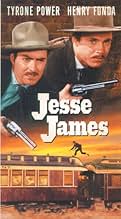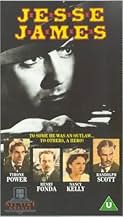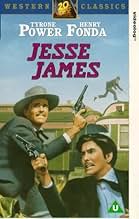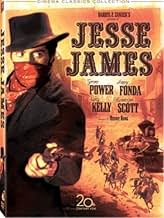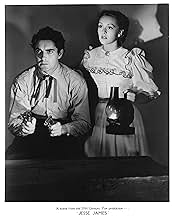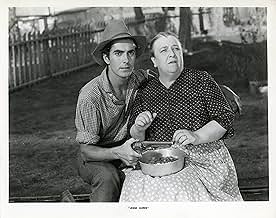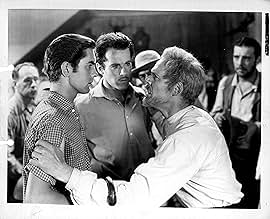El ferrocarril avanza por territorio americano a finales del siglo XIX y la familia James, como muchas otras, es desahuciada para permitir su paso. Los hermanos James se toman la justicia po... Leer todoEl ferrocarril avanza por territorio americano a finales del siglo XIX y la familia James, como muchas otras, es desahuciada para permitir su paso. Los hermanos James se toman la justicia por su mano.El ferrocarril avanza por territorio americano a finales del siglo XIX y la familia James, como muchas otras, es desahuciada para permitir su paso. Los hermanos James se toman la justicia por su mano.
- Dirección
- Guionistas
- Elenco
- Jesse James Jr.
- (as John Russell)
Opiniones destacadas
the title role at all, but his role as written lacks the complexity some
commentators are insisting upon. Fonda is excellent playing the role that he played over and over the next decade or so. The family scenes are to me very touching. What nobody mentioned is the wonderful locale--actually shot in the Ozarks rather than Simi Valley or the Fox ranch. Having been raised in
Independence, Mo and growing up on the James boys legends, this is a major
plus over other versions, and I think the movie is a triumph. Those who don't find fault with it because it isn't made according to today's standards of
film-making style should enjoy it thoroughly. That said, my own favorite James movie is The Long Riders, especially thanks to the incomparable Carradines.
Following closely is The Great Northfield Minnesota Raid, an even loonier
distortion of history, but eminently satisfying!
Teamed with Henry Fonda, and stalwart Randolph Scott, Henry King came with a Western classic, considered as one the best Jesse James of the series
The film opens in Pineville with hothead Jesse and temperate Frank as a couple of Missouri brothers who, embittered by the ruthless tactics of a railroad agent, got a warrant and had to skip out, hiding out until Major Rufus Cobb (Henry Hull) can get the governor to give them a fair trial But the railroad's got too much at stake to let two farmer boys bollix things up
After they had thrown Barshee (Brian Donlevy), the brutal railroad representative off the farm of their widowed mother (Jane Darwell) when she refused to sign over her property, Jesse and Frank later learn that she had been killed by a bomb tossed into their home by Barshee himself Jesse returns, shoots Barshee, and vows revenge on the railroad, with the complete sympathy of the Missouri populace
Jesse's sweetheart, Zee and her uncle, publisher Major Rufus, are among the James' supporters, as is U. S. Marshal Will Wright (Scott), but he has a job to do and is forced to track down the two brothers
Jesse and Frank have expanded their operation from merely harassing the St. Louis Midland with a series of holdups to robbing banks
Pursuaded by railroad president McCoy (Donald Meek) to talk Jesse into surrendering, Wright extracts a written promise of a light sentence for the desperado Zee then urges Jesse to give himself up following their wedding
Of course, Henry King tries to show how Jesse hated the railroads and from that hate he presented a charismatic hero But this hero was not going to last The more luck he had, the worse he gets It'll be his appetite for shooting and robbing until something happens to him
He also shows a worried fiancée keeping thinking of an outlaw all the time out there in the hills just going on and on to nowhere just trying to keep alive with everybody after him, wanting to kill him to get that money
There's a scene near the end where Zee (Nancy Kelly) after delivering her baby is lying in bed with her creature, with the presence of the Marshal, so to speak, between herself and her uncle that suddenly made clear to me what the entire film was about Her feelings as a woman: "I'm so tired to care. This is the way it always is. We live like animals, scared animals. We move. We hide. We don't dare to go out "
Obviously she is a sensitive woman who exposes her being on screen without losing sight of reality That's quite a great scene from King, and key in this great Western, as it's really all about her character, Zee Cobb, a struggling woman in love now a mother with a baby to take care of
So please don't miss it!
Less so since the courtly southerner Nunnally Johnson wrote and produced the yarn. In reality the James boys took to knocking off banks and trains after being at a loose end following Missouri's joining the losing side in the War Between the States. This was too painful a scab to pick in the Thirties, so Johnson gives the Jameses a more palatable enemy than Abe Lincoln: big bad railroad barons upsetting their ma. And he paints his outlaws with a populist tint, to please New Deal Democrats as well as Dixiecrats who knew the real backstory.
However, the broad outlines of their rise and fall are intact. We see a gradual slide into semi-chivalrous villainy (they didn't rob train passengers, only mails), a 'Liberty Valance'-like exploitation of their coups by political orators and editors, Jesse's becoming consumed by his own legend, and the final botched bank job at Northfield, Minnesota. That leads to a panicky flight and an attempt to live semi-respectably under pseudonyms, followed by Bob Ford's betrayal as Jesse turns art curator.
The film is pleasingly quiet between action set pieces, free of the obtrusive music that was often the curse of Hollywood soundtracks and laced with good lines from Johnson's florid pen. And above all, surrounded by good character actors, we have two rising Zanuck stars tussling enjoyably for mastery, both in the plot and career-wise.
Henry King had become Power's preferred handler ('In Old Chicago' the previous year had been a wow) and both men evidently relish the challenge of tweaking his 'nice bank teller' image a little. Swarthy and bearded betimes, barking out orders to older subordinates, Power does fine. Fonda's grand remonstrance, when he tells Junior that he's turning into a suicidal psycho, is ably played and paced. The soft early tripack Technicolor looks sweet both outdoors-- Ford was getting similar results in 'Drums Along the Mohawk'-- and in candle-lit interiors.
Also noteworthy is Jesse's respectful, confiding relationship with his black ex-slave Pinky (Ernest Whitman) when he decides not to pursue Frank. Black maids could sass their mistresses in crazy comedies, but this quality of understanding between men of different colours was unusual in early-talkie Hollywood.
'Jesse James' was released in Hollywood's peak year, 1939. It's understandable that it was overlooked. But when we've done finger-wagging at the cruelty to horses which led the American Humane Association to demand supervisory privileges over stampedes-- and the cruelty to female Central Casting members which allowed Power to father a child on one-- we can still appreciate a good, workmanlike travesty of outlaw history. As a distortion of the James-Younger saga it has not been surpassed.
At the heart of the matter is basically another version of the oft-told David and Goliath tale. In this story, Goliath is the railroad, expanding ever-westward and growing bigger and stronger by the day. When they encounter the farm on which Jesse, his brother, Frank (Henry Fonda) and their mother (Jane Darwell) reside and make their living, the railroad does what any self-respecting conglomerate would do-- they take it, pay the owners a pittance and lay their rail without giving it another thought. Only this time, the railroad messed with the wrong people. Not one to take it lying down, Jesse forms a gang-- which includes Frank-- and strikes back in the only way he knows how: By robbing the trains. And, just as Bonnie and Clyde would become, in a sense, local heroes a few years later, many began looking up to James as something of a redeemer; the man who stood up for all the others who were either unwilling or unable to do it for themselves after being wronged, as well, by the ruthless machinery of progress.
Power gives an outstanding performance as Jesse James, to whom he brings an intensity that seethes beneath his rugged good looks and determined attitude. Like Beatty did with Clyde, Power makes Jesse an outlaw you can't help but like, and actually admire. Because the James Power presents is nothing more nor less than a good man seeking reparation for the injury visited not only upon himself, but upon his family, to whom he feels justice is now due. It's a very credible and believable portrayal, though under close scrutiny his Jesse may come across as somewhat idealistically unflawed. Then again, within the time frame of this story, we are seeing a man adamant and single-minded of purpose, and the depth Power brings to the character more than accounts for what may be construed as a flawless nature.
As Frank James, Henry Fonda presents a man perhaps more laid-back than his brother, but every bit as volatile and adamant in his quest for justice. There's a coolness in his eyes and in his manner that belies the tenacity of his character. Fonda conveys the sense that Frank is a lion; he's no trouble without provocation, but once aroused he will demand satisfaction and stay with the scent until he has it. And it's that sense of dogged determination that Fonda and Power bring to their respective characters that makes them so engaging and accessible. Goliath is the real bad guy here, and you want to see him fall; and these are the guys you want to see bring him down.
In a supporting role, John Carradine gives a noteworthy performance as Jesse's own personal Judas, Bob Ford, a man who made history by demonstrating that there is, indeed, no honor among thieves. Carradine brings Ford to life in a sly and sinister way that leaves no doubt as to who the real villain of the story is.
The supporting cast includes Nancy Kelly (Zee), Randolph Scott (Will), Slim Summerville (Jailer), Brian Donlevy (Barshee), Donald Meek (McCoy), Charles Tannen (Charlie Ford), Claire Du Brey (Mrs. Ford) and Henry Hull, in an energetic and memorable performance as Major Rufus Cobb. Compared to many of the westerns made in the past couple of decades or so, this film is rather antiseptic in it's presentation; that is to say it lacks the graphic visuals of say, `The Wild Bunch' or Eastwood's `Unforgiven.' But `Jesse James' is satisfying entertainment that doesn't require or rely upon shocking realism to tell the story, but rather the talent and finesse of a great cast and a savvy director. It's a movie that will keep you involved, and Power and Fonda make it an especially enriching cinematic experience. In a very classic sense, this is the magic of the movies. I rate this one 8/10.
¿Sabías que…?
- TriviaAfter the two horses that were blindfolded and forced to go over a cliff were killed, a new rule was enforced and later endorsed by The Humane Society of America in which strict standards were created to protect animals. Productions that met the standards of the Humane Society were allowed to add "No Animals Were Harmed or Injured in the Production of this Film" to the end credits. Eventually all the studios agreed that films involving any animals must have present a representative of The Humane Society to ensure that all animals are treated humanely and given a safe environment in which to work.
- ErroresThe movie shows a bomb killing Frank and Jesse's mother. In reality, the bomb thrown through the window by the Pinkerton agents killed their little brother and seriously wounded their mother, who survived although she lost an arm in the explosion.
- Citas
[last lines]
[about Jesse James]
Major Rufus Cobb: He was one of the doggonedest, gawl-dingedest, dad-blamedest buckaroos that ever rode across these United States of America!
- Créditos curiososOpening credits prologue: After the tragic war between the states, America turned to the winning of the West. The symbol of this era was the building of the trans-continental railroads.
The advance of the railroads was, in some cases, predatory and unscrupulous. Whole communities found themselves victimized by an ever-growing ogre - the Iron Horse.
It was this uncertain and lawless age that gave to the world, for good or ill, its most famous outlaws, the brothers Frank and Jesse James.
- Versiones alternativasAll UK versions were cut by 13 secs by the BBFC to remove footage of horse-falls including the controversial scene of a horse fatally falling from a cliff.
- ConexionesEdited into Myra Breckinridge (1970)
- Bandas sonorasThe Battle Cry of Freedom
(1862) (uncredited)
Written by George Frederick Root
Played by the band at the railroad station
Selecciones populares
- How long is Jesse James?Con tecnología de Alexa
Detalles
- Fecha de lanzamiento
- País de origen
- Idioma
- También se conoce como
- Darryl F. Zanuck's Production of Jesse James
- Locaciones de filmación
- Productora
- Ver más créditos de la compañía en IMDbPro
Taquilla
- Presupuesto
- USD 1,600,000 (estimado)
- Total a nivel mundial
- USD 3,444
- Tiempo de ejecución
- 1h 46min(106 min)
- Color
- Relación de aspecto
- 1.37 : 1



